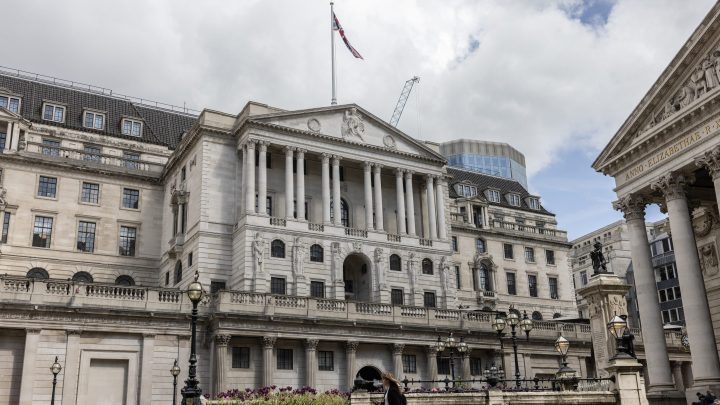
Was the Bank of England largely to blame for the UK’s inflation?
Was the Bank of England largely to blame for the UK’s inflation?

The reasons for the inflation that has beset the developed world over the past year are well established. It’s mainly due — we are told — to supply chains disrupted by the COVID-19 pandemic, and energy and commodity shortages caused by the war in Ukraine. But a new right-leaning pressure group blames Britain’s central bank, the Bank of England, for much of the problem in the United Kingdom.
The Honest Money Initiative claims that by creating more than a trillion dollars and pumping it into the U.K. economy, in a process called quantitative easing, the central bank added fuel to the fire and made matters much worse.
“The Bank blames COVID, the war in Ukraine, China, climate change, labor shortages caused by early retirement and large pay hikes,” said Max Rangeley, co-chair of the Honest Money Initiative. “The bank has blamed inflation on just about everything other than the Bank of England.”
Rangeley, who also heads the right-leaning Cobden Centre free market think tank, argues that by imposing ultra low interest rates, assisted by quantitative easing — aka money printing — for more than a decade, the Bank of England has done untold damage.
“This has created in large part the inflation that we’re seeing today as well as all the distortions and asset bubbles and many other problems in the economy,” he said.
Over the past decade, he claimed, households and businesses have been lured into borrowing excessively at rock-bottom interest rates, more and more money flooded into the housing market inflating prices, and cheap credit has kept scores of failing or “zombie” companies afloat. The Honest Money Initiative has a key demand.
“We’re calling on the government to take away from the Bank of England the power to create unlimited amounts of money out of thin air,” Rangeley said.
This power was first exercised in the U.K. in 2009 after the global financial crisis. The bank was trying to encourage spending to stop the economy falling off a cliff but, as independent economist and British Conservative politician Warwick Lightfoot explained, the bank faced a major impediment.
“Short-term interest rates were already very, very low, almost zero. They had cut short-term interest rates as far as they could. And so, they used another way to reduce longer term, market interest rates. They did this by buying government debt, treasury bonds, gilts. Later, they bought some corporate bonds as well,” he said.
The effect of these purchases was that they raised the price of bonds and, therefore, lowered the interest rate in percentage terms. Using quantitative easing over the past decade, the bank created and pumped into the U.K. economy around $1.17 trillion, a sum equivalent to more than a third of the country’s GDP.
The bank says that QE has been essential to stave off severe economic contraction, not only after the global financial crisis, but also after the shock decision to leave the European Union in 2016, and more recently the COVID pandemic.
Criticism of the bank’s approach, however, has not been confined to the Honest Money Initiative.
Appearing before a committee of the upper house of Parliament, the House of Lords, the man who was once the most senior civil servant in the U.K. Treasury, Lord Nicholas Macpherson, expressed his reservations about money printing.
“I’m not against QE in principle. But I fear we went too far,” he said.
The first dose of QE in 2009 made sense, Macpherson said, but subsequent injections were dangerous. “I once compared it to heroin,” he said. “The economy gets addicted to it and needs bigger and bigger fixes for it to have an impact.”
Withdrawal of the QE will be painful, with QE now in abeyance and interest rates headed inexorably higher, many poorly performing companies could go bust. But that is part of the necessary process of renewal in a market economy, according to Lightfoot.
“You have to be prepared to let go of businesses that aren’t functioning well,“ he said. “You may well see companies close down, their resources and their stock sold off. You need to have an orderly process of insolvency and bankruptcy, so that new managers can come in and make better use of those resources.”
Lightfoot is critical of what he sees as central banks (including the Federal Reserve) failing to remember the hard lessons of economic history and using a highly accommodating monetary policy to avoid the pain that capitalism’s creative destruction requires.
In the United States and the eurozone, like the Bank of England, both the Fed and the ECB also engaged heavily in QE and ultra low interest rates. But the British inflation rate has been worse than America’s or the eurozone’s, perhaps because the U.K. was more exposed to higher energy prices, and because the Bank of England has been slower in tackling the monetary excesses of the past decade.
Pain is certainly on the way for British mortgage holders. The Bank of England recently warned that with higher interest rates a million and a half homeowners could face extra mortgage payments ranging from $650 to $1,000 a month. That would mean a huge fall in disposable income, a further hit to the popularity of the government, currently head by the Conservative Party and perhaps, more flak for the Bank of England.
There’s a lot happening in the world. Through it all, Marketplace is here for you.
You rely on Marketplace to break down the world’s events and tell you how it affects you in a fact-based, approachable way. We rely on your financial support to keep making that possible.
Your donation today powers the independent journalism that you rely on. For just $5/month, you can help sustain Marketplace so we can keep reporting on the things that matter to you.

















